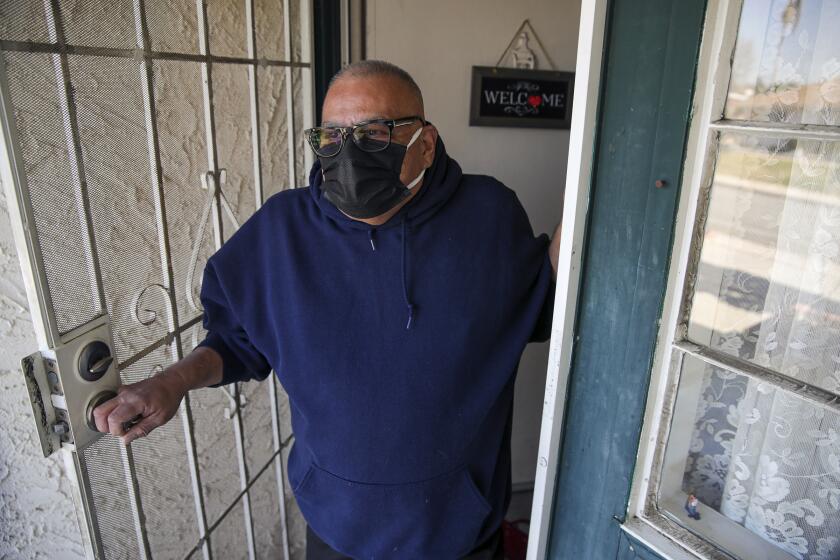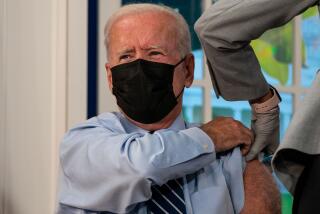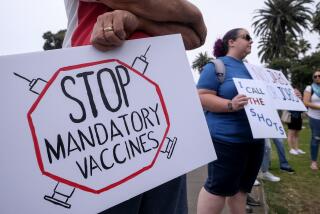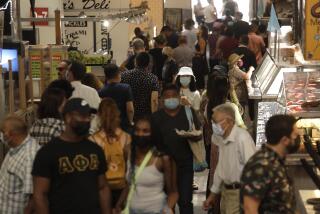My wife is vaccinated. I’m not. Welcome to the new world of haves and have-nots
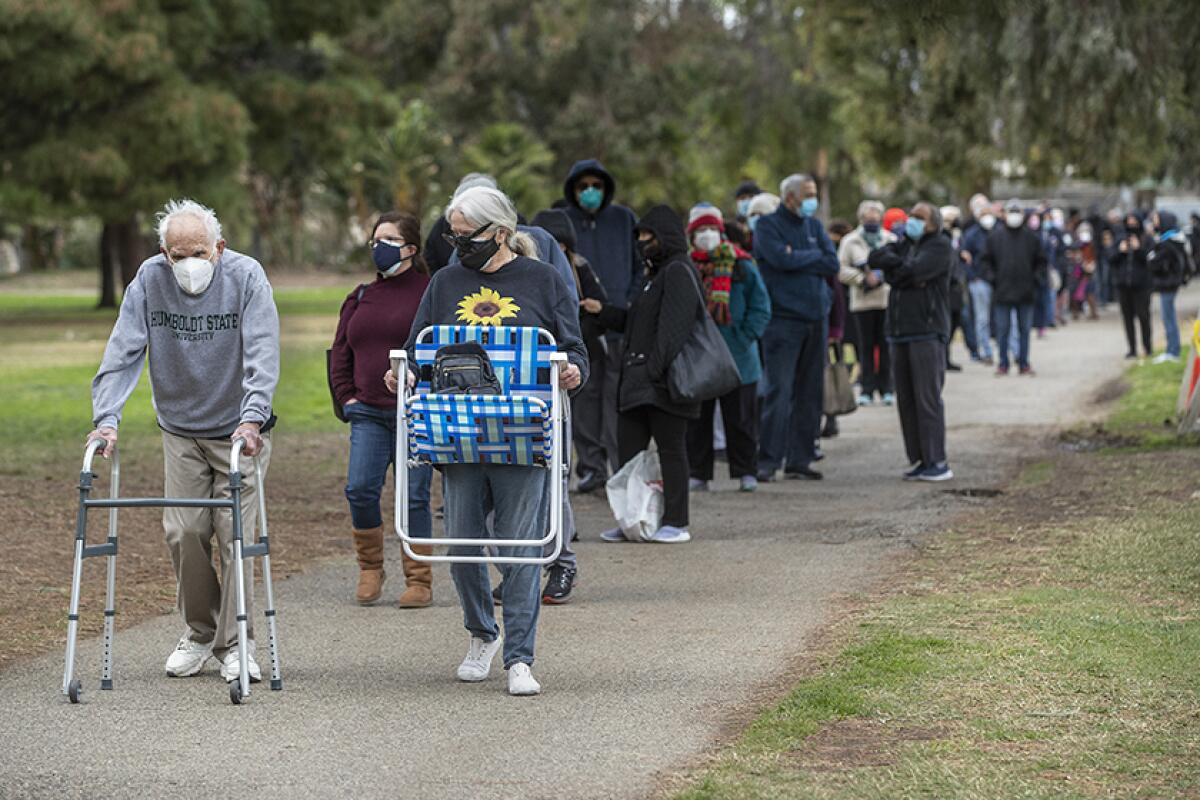
- Share via
In my house, we have a problem. My wife has been vaccinated; I haven’t.
Am I envious? Of course I am. Resentful? Yeah, some of that too. When she came home all cheerful after her second COVID-19 vaccine shot last week, I couldn’t help feel that she had crossed safely to the other side of a giant chasm, while I remained at the edge of the cliff.
Later, when she complained of a headache and some chills from the second shot, I was, perhaps, a tad less sympathetic than I could have been.
For a year we’ve been housebound together. But suddenly she was eligible for her shots and I was not. And now (or presumably very soon), she’ll be able to traipse off to a restaurant or a rave or an orgy or a national insurrection, while I’ll still be cowering at home hiding from the virus.
The pervasive fear is gone, though not everyone is ready to resume pre-pandemic habits after receiving both vaccine doses.
In a way, we’re a microcosm of the country — or of the world, really. We’re divided into haves and have-nots. In our household, she’s the have, and I’m the have-not.
Currently in the U.S., only about 13.6% of the population has received at least one COVID-19 vaccine shot, according to data from the Centers for Disease Control and Prevention; that’s about 1 in 8 of us.
That’s not good. It’s a recipe for a two-tiered society, in which some people are officially permitted a return to a normality that remains forbidden to the rest of us.
Don’t believe it? Consider what’s already happening in Israel, where the government recently reopened gyms, hotels and swimming pools — but only for those who have been vaccinated and have the “green badge” to prove it.
Or Denmark, where authorities are planning to roll out “vaccine passports” — which will enable travelers to prove they’ve been inoculated before getting on a plane.
IBM is developing a “digital health pass” that would allow people to present proof of vaccination to be admitted to sports arenas, airplanes or workplaces.
The New York Times reported that Americans over 65, newly vaccinated and “newly emboldened,” are leading a wave in new travel bookings. On the road again with the lucky 13.6%!
And in what may be the biggest return to normality for the lucky people who’ve had their shots, the L.A. Times quoted medical experts Thursday saying that they can now “enjoy a sex life with other vaccinated people” outside their bubble.
I’m not saying this new bifurcated, “your-papers-please” society doesn’t make some sense. If it is ultimately shown that vaccinated people really can’t pass the virus on to others (which is not certain yet), then why wouldn’t we allow them greater freedom to reenter the world?
But it’s going to be a weird interregnum.
Sure, people are being told for the moment that even after they get their shots, they should continue to social distance and, for God’s sake, keep those masks on. Dr. Fauci himself said it is possible Americans will be wearing masks into 2022. And, yes, there are reasons to fear a resurgence due to new variants that don’t respond as well to the existing vaccines.
But even my 89-year-old father, who is due for his first vaccine shot in a few days, was pretty clear that he saw it as the ultimate game-changer. “Next week,” he told me, “we’ll be safe and can stop worrying and go back to regular life.”
This state of affairs isn’t just dividing husbands and wives, or parents and children.
There are divisions also between races, between economic classes, between people born just months apart.
And between countries. The share of the population that has been vaccinated in North America and Europe — you’ll be shocked to learn — is far greater than the share in Asia, Africa and South America. In North America, for instance, there have been 11.9 doses administered per 100 people; in Africa, it’s 0.2 doses per 100.
Experts have expressed concern about “vaccine nationalism,” a scenario in which the wealthy countries of the world hoard the vaccine, leaving the virus to run rampant elsewhere.
And that, of course, is disastrous to all of us, since the virus will continue to mutate wherever it can continue to infect people unchecked, and those new variants won’t respect borders.
“There is only one victor in a world of vaccine haves and vaccine have-nots: the virus itself,” said U.N. Secretary-General António Guterres last month.
The end of this pandemic was always going to be difficult. Inevitably, the battle over masks and social distancing was going to fade away, transformed into a culture war over who gets vaccinated first. Teachers but not professors? Sixty-five-year-olds but not 64-year-olds? Who qualifies as an essential worker? Does asthma count as an underlying condition? How about bone spurs? Why are the communities with the most cases also the slowest to be vaccinated?
Unsurprisingly, there’s rage at the people jumping the lines. Like the two women who allegedly dressed up as “grannies” in bonnets and spectacles to sneak into a Florida vaccination center. Or the Angelenos misusing “access codes” designed to help hard-hit communities of color gain access to the vaccine.
It’s all nerve-wracking. No one wants to die at this late stage in the pandemic, when the end seems within sight. You don’t want to get sick because your 65th birthday isn’t until September or because you have to go to work and don’t have time to sit on hold for an appointment. And you certainly don’t want to get COVID because they ran out of vaccine after giving doses to the two fake grannies ahead of you in line.
Of course I’m glad my wife is protected. I’m relieved for her and I sincerely hope she’ll enjoy the rave. But I’m ready for my shots as well.
More to Read
A cure for the common opinion
Get thought-provoking perspectives with our weekly newsletter.
You may occasionally receive promotional content from the Los Angeles Times.
